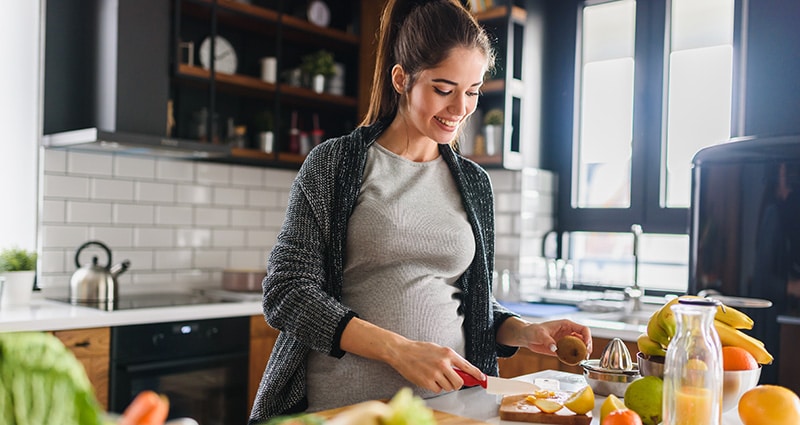Should you eat for two when you’re expecting a bundle of joy?
Not quite, says Carmen Alexis Miller, MS, RDN, LDN, outpatient dietitian at Our Lady of Lourdes Women’s & Children’s Hospital. She shares some advice about how moms-to-be can approach nourishing their bodies through all maternity.
How Much More Food?
The concept of “eating for two” is a misnomer, implying women should eat double the amount of food during pregnancy. In reality, expecting moms’ nutritional needs vary. Most women need around 300 additional calories per day starting in the second trimester, which is the equivalent of an additional good snack.
The concept of “eating for two” can serve as a gentle reminder that your baby relies on you for nourishment. Make sure most food you eat during pregnancy is nutrient dense so that it’s good for you AND your little one. Get your extra calories from nutritious foods, and remember to drink plenty of fluids, about 12 cups of water or other caffeine-free beverages each day.
Focus Foods
Needs for certain nutrients increase during pregnancy, including vitamin A, folate, vitamin B12, choline, iron and iodine. By focusing on certain foods and incorporating them into your diet, you’ll provide yourself with the nutrients you need as you’re growing a healthy baby.
Miller encourages whole, organic, grass-fed and pasture-raised animal products and vegetables, when possible, but even conventionally sourced products are better than none at all. Her focus foods that provide specific vitamins and minerals throughout pregnancy include eggs, liver, slow-cooked meat and bone broth, leafy greens and other vegetables, cold water fish and full-fat and fermented dairy products.
Finding Balance
Pregnancy is just the first part of your parenting journey, and finding balance during that season of your life can set you up for success along the way. Part of that balance comes from your pregnancy diet.
Appetite changes during pregnancy are expected. From food aversions and nausea during the first trimester to heartburn and early fullness toward the end of pregnancy, eating smaller meals consistently throughout the day with snacks in between will help you feel your best. We have more tips for dealing with morning sickness here.
As you time your meals, make sure to never get overly hungry, keeping blood sugar and energy levels stable. This also makes sure baby gets a consistent supply of nutrients throughout the day.
Eat protein at each meal. Good choices include meat, fish, poultry, nuts and nut butters, eggs, beans and lentils. In the first half of pregnancy aim for at least 80 grams of protein per day, and in the second half of pregnancy aim for at least 100 grams of protein per day.
The Plate Method is a great way to visually plan meals without being strict with measurements. Fill about half your plate with non-starchy vegetables with a fat source such as avocado, dressing or butter to help absorb vitamins and minerals in the veggies. The other half of the plate should be divided between proteins and carbohydrates, which can be starchy vegetables. Not all meals need a carb portion. Meals with vegetables, fat and protein only are perfectly acceptable.
Prenatal Vitamins
A prenatal vitamin can act like a little insurance policy—an important way to round out your nutritional needs during pregnancy. However, not all prenatal vitamins are created equal. Your provider can help you choose the right one for you.
Additional Resources
Miller recommends Real Food for Pregnancy: The science and wisdom of optimal prenatal nutrition by Lily Nichols, RDN, CDE, as a resource for expecting moms on their pregnancy journeys.
If you have any questions or concerns about your overall diet and nutrient needs while pregnant, ask your provider for assistance. You can connect with one of our exceptional providers here.




